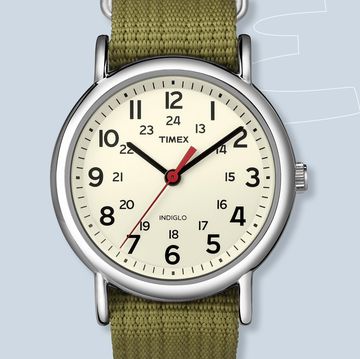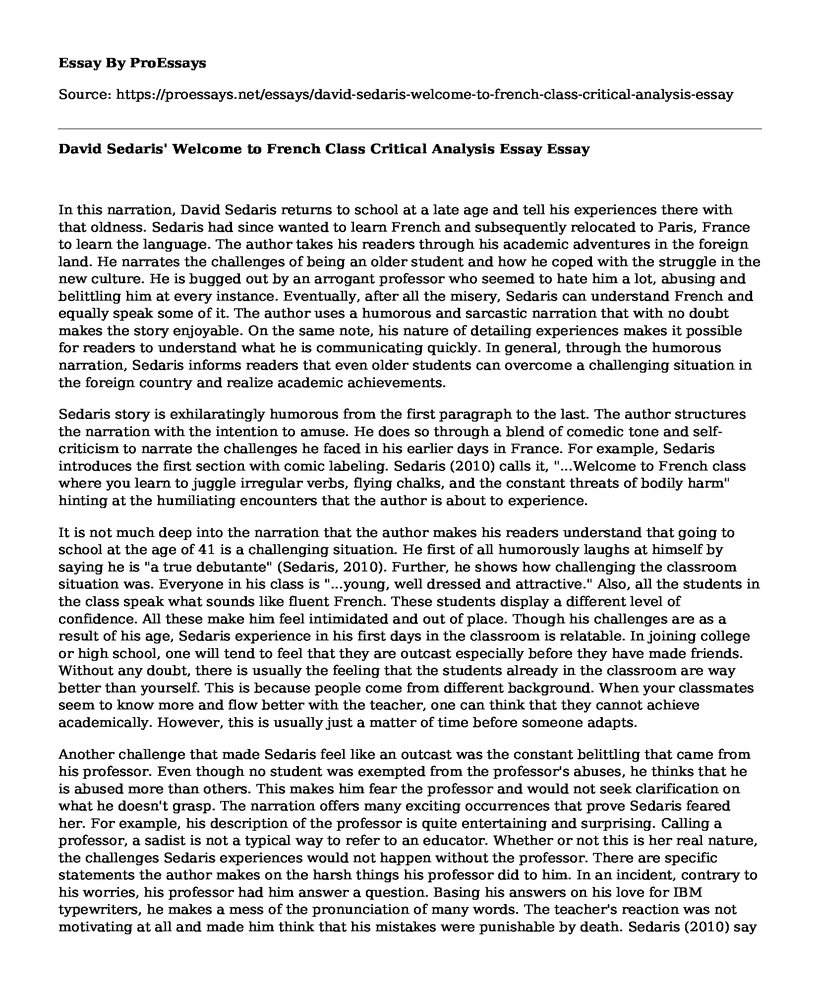Me Talk Pretty One Day
At the age of forty-one, I am returning to school and having to think of myself as what my French textbook calls "a true debutant." After paying my tuition, I was issued a student ID, which allows me a discounted entry fee at movie theaters, puppet shows, and Festyland, a far-flung amusement park that advertises with billboards picturing a cartoon stegosaurus sitting in a canoe and eating what appears to be a ham sandwich.
I've moved to Paris in order to learn the language. My school is the Alliance Française, and on the first day of class, I arrived early, watching as the returning students greeted one another in the school lobby. Vacations were recounted, and questions were raised concerning mutual friends with names like Kang and Vlatnya. Regardless of their nationalities, everyone spoke what sounded to me like excellent French. Some accents were better than others, but the students exhibited an ease and confidence I found intimidating. As an added discomfort, they were all young, attractive, and well dressed, causing me to feel not unlike Pa Kettle trapped backstage after a fashion show.
I remind myself that I am now a full-grown man. No one will ever again card me for a drink or demand that I weave a floor mat out of newspapers. At my age, a reasonable person should have completed his sentence in the prison of the nervous and the insecure--isn't that the great promise of adulthood? I can't help but think that, somewhere along the way, I made a wrong turn. My fears have not vanished. Rather, they have seasoned and multiplied with age. I am now twice as frightened as I was when, at the age of twenty, I allowed a failed nursing student to inject me with a horse tranquilizer, and eight times more anxious than I was the day my kindergarten teacher pried my fingers off my mother's ankle and led me screaming toward my desk. "You'll get used to it," the woman had said.
I'm still waiting.
The first day of class was nerve-racking, because I knew I'd be expected to perform. That's the way they do it here--everyone into the language pool, sink or swim. The teacher marched in, deeply tanned from a recent vacation, and rattled off a series of administrative announcements. I've spent some time in Normandy, and I took a monthlong French class last summer in New York. I'm not completely in the dark, yet I understood only half of what this teacher was saying.
"If you have not meismslsxp by this time, you should not be in this room. Has everybody apzkiubjxow ? Everyone? Good, we shall proceed." She spread out her lesson plan and sighed, saying, "All right, then, who knows the alphabet?"
It was startling, because a) I hadn't been asked that question in a while, and b) I realized, while laughing, that I myself did not know the alphabet. They're the same letters, but they're pronounced differently.
"Ahh." The teacher went to the board and sketched the letter a. "Do we have anyone in the room whose first name commences with an ahh?"
Two Polish Annas raised their hands, and the teacher instructed them to present themselves, giving their names, nationalities, occupations, and a list of things they liked and disliked in this world. The first Anna hailed from an industrial town outside of Warsaw and had front teeth the size of tombstones. She worked as a seamstress, enjoyed quiet times with friends, and hated the mosquito.
"Oh, really," the teacher said. "How very interesting. I thought that everyone loved the mosquito, but here, in front of all the world, you claim to detest him. How is it that we've been blessed with someone as unique and original as you? Tell us, please."
The seamstress did not understand what was being said, but she knew that this was an occasion for shame. Her rabbity mouth huffed for breath, and she stared down at her lap as though the appropriate comeback were stitched somewhere alongside the zipper of her slacks.
The second Anna learned from the first and claimed to love sunshine and detest lies. It sounded like a translation of one of those Playmate of the Month data sheets, the answers always written in the same loopy handwriting: "Turn-ons: Mom's famous five-alarm chili! Turnoffs: Insincerity and guys who come on too strong!!!"
The two Polish women surely had clear notions of what they liked and disliked, but, like the rest of us, they were limited in terms of vocabulary, and this made them appear less than sophisticated. The teacher forged on, and we learned that Carlos, the Argentine bandonion player, loved wine, music, and, in his words, "Making sex with the women of the world." Next came a beautiful young Yugoslavian who identified herself as an optimist, saying that she loved everything life had to offer.
The teacher licked her lips, revealing a hint of the sadist we would later come to know. She crouched low for her attack, placed her hands on the young woman's desk, and said, "Oh, yeah? And do you love your little war?"
While the optimist struggled to defend herself, I scrambled to think of an answer to what had obviously become a trick question. How often are you asked what you love in this world? More important, how often are you asked and then publicly ridiculed for your answer? I recalled my mother, flushed with wine, pounding the table late one night, saying, "Love? I love a good steak cooked rare. I love my cat, and I love . . ." My sisters and I leaned forward, waiting to hear our names. "Tums," our mother said. "I love Tums."
The teacher killed some time accusing the Yugoslavian girl of masterminding a program of genocide, and I jotted frantic notes in the margins of my pad. While I can honestly say that I love leafing through medical textbooks devoted to severe dermatological conditions, it is beyond the reach of my French vocabulary, and acting it out would only have invited unwanted attention.
When called upon, I delivered an effortless list of things I detest: blood sausage, intestinal pâté, brain pudding. I'd learned these words the hard way. Having given it some thought, I then declared my love for IBM typewriters, the French word for "bruise," and my electric floor waxer. It was a short list, but still I managed to mispronounce IBM and afford the wrong gender to both the floor waxer and the typewriter. Her reaction led me to believe that these mistakes were capital crimes in the country of France.
"Were you always this palicmkrexjs ?" she asked. "Even a fiuscrzsws tociwegixp knows that a typewriter is feminine."
I absorbed as much of her abuse as I could understand, thinking, but not saying, that I find it ridiculous to assign a gender to an inanimate object incapable of disrobing and making an occasional fool of itself. Why refer to Lady Flesh Wound or Good Sir Dishrag when these things could never deliver in the sack?
The teacher proceeded to belittle everyone from German Eva, who hated laziness, to Japanese Yukari, who loved paintbrushes and soap. Italian, Thai, Dutch, Korean, Chinese--we all left class foolishly believing that the worst was over. We didn't know it then, but the coming months would teach us what it is like to spend time in the presence of a wild animal. We soon learned to dodge chalk and to cover our heads and stomachs whenever she approached us with a question. She hadn't yet punched anyone, but it seemed wise to prepare ourselves against the inevitable.
Though we were forbidden to speak anything but French, the teacher would occasionally use us to practice any of her five fluent languages.
"I hate you," she said to me one afternoon. Her English was flawless. "I really, really hate you." Call me sensitive, but I couldn't help taking it personally.
Learning French is a lot like joining a gang in that it involves a long and intensive period of hazing. And it wasn't just my teacher; the entire population seemed to be in on it. Following brutal encounters with my local butcher and the concierge of my building, I'd head off to class, where the teacher would hold my corrected paperwork high above her head, shouting, "Here's proof that David is an ignorant and uninspired ensigiejsokhjx ."
Refusing to stand convicted on the teacher's charges of laziness, I'd spend four hours a night on my homework, working even longer whenever we were assigned an essay. I suppose I could have gotten by with less, but I was determined to create some sort of an identity for myself. We'd have one of those "complete the sentence" exercises, and I'd fool with the thing for hours, invariably settling on something like, "A quick run around the lake? I'd love to. Just give me a minute to strap on my wooden leg." The teacher, through word and action, conveyed the message that, if this was my idea of an identity, she wanted nothing to do with it.
My fear and discomfort crept beyond the borders of my classroom and accompanied me out onto the wide boulevards, where, no matter how hard I tried, there was no escaping the feeling of terror I felt whenever anyone asked me a question. I was safe in any kind of a store, as, at least in my neighborhood, one can stand beside the cash register for hours on end without being asked something so trivial as, "May I help you?" or "How would you like to pay for that?"
My only comfort was the knowledge that I was not alone. Huddled in the smoky hallways and making the most of our pathetic French, my fellow students and I engaged in the sort of conversation commonly overheard in refugee camps.
"Sometimes me cry alone at night."
"That is common for me also, but be more strong, you. Much work, and someday you talk pretty. People stop hate you soon. Maybe tomorrow, okay?"
Unlike other classes I have taken, here there was no sense of competition. When the teacher poked a shy Korean woman in the eyelid with a freshly sharpened pencil, we took no comfort in the fact that, unlike Hyeyoon Cho, we all knew the irregular past tense of the verb "to defeat." In all fairness, the teacher hadn't meant to hurt the woman, but neither did she spend much time apologizing, saying only, "Well, you should have been paying more attention."
Over time, it became impossible to believe that any of us would ever improve. Fall arrived, and it rained every day. It was mid-October when the teacher singled me out, saying, "Every day spent with you is like having a cesarean section." And it struck me that, for the first time since arriving in France, I could understand every word that someone was saying.
Understanding doesn't mean that you can suddenly speak the language. Far from it. It's a small step, nothing more, yet its rewards are intoxicating and deceptive. The teacher continued her diatribe, and I settled back, bathing in the subtle beauty of each new curse and insult.
"You exhaust me with your foolishness and reward my efforts with nothing but pain, do you understand me?"
The world opened up, and it was with great joy that I responded, "I know the thing what you speak exact now. Talk me more, plus, please, plus."


@media(max-width: 73.75rem){.css-1ktbcds:before{margin-right:0.4375rem;color:#FF3A30;content:'_';display:inline-block;}}@media(min-width: 64rem){.css-1ktbcds:before{margin-right:0.5625rem;color:#FF3A30;content:'_';display:inline-block;}} Lifestyle

79 Can’t-Miss Gifts for Every Man in Your Life

Up to 50% Off Deals at Patagonia’s Web Specials

24 Weed Accessories You'll Want to Display

The 12 Best Closet Systems for Getting Organized

The 35 Best Gifts for Gardeners

13 Curved Couches That'll Liven Up Your Living Roo

How (Not) To Grieve

The 4 Best VR Headsets for Virtual Reality Gaming

Amazon Has Great Watches on Sale Right Now

The Small Shower Speaker With Big Sound

Angling for the Big Fish That Breaks Hearts
Home — Essay Samples — Literature — Me Talk Pretty One Day — Learning Motivation In Me Talk Pretty One Day By David Sedaris
Learning Motivation in Me Talk Pretty One Day by David Sedaris
- Categories: Me Talk Pretty One Day
About this sample

Words: 1083 |
Published: May 14, 2021
Words: 1083 | Pages: 2 | 6 min read
Works Cited
- Sedaris, David. “Me Talk Pretty One Day.” 50 Essays: A Portable Anthology 5th Edition. Bedford/St. Martin’s, 2017. Pp. 333-337.

Cite this Essay
Let us write you an essay from scratch
- 450+ experts on 30 subjects ready to help
- Custom essay delivered in as few as 3 hours
Get high-quality help

Prof Ernest (PhD)
Verified writer
- Expert in: Literature

+ 120 experts online
By clicking “Check Writers’ Offers”, you agree to our terms of service and privacy policy . We’ll occasionally send you promo and account related email
No need to pay just yet!
Related Essays
6.5 pages / 3030 words
7 pages / 3276 words
3.5 pages / 2123 words
7 pages / 3092 words
Remember! This is just a sample.
You can get your custom paper by one of our expert writers.
121 writers online
Still can’t find what you need?
Browse our vast selection of original essay samples, each expertly formatted and styled
Related Essays on Me Talk Pretty One Day
The narratives presented by both writers in “Prison Studies” and “Me Talk Pretty One Day,” both describe each author’s pursuit of literacy given different circumstances. In Sedaris’s account, he is illiterate in the French [...]
David is 41 years old and returns to school. After some French lessons back in New-York, he goes to Paris were he wants to learn perfect French. As student you have some advantages, like discounts on food and the cinema or other [...]
In “Me Talk Pretty One Day” by David Sedaris, the author spends the first part of the book describing his childhood years in North Carolina with his many siblings. He talks about how he had to go through speech therapy, music [...]
The fear of a dystopian future that is explored in both Fritz Lang’s film Metropolis and George Orwell’s novel Nineteen Eighty Four is reflective of the values of the societies at the time and the context of the authors. As [...]
Problems faced by characters in literature often repeat themselves, and when these characters decide to solve these standard problems, their actions are often more similar than they first appear. This idea is evident when [...]
In order for one to exist in a totalitarian society whose government is successful in its control, one must deal on a day-to-day basis with strong persuasion and propaganda. These totalitarian societies have an iron grip on [...]
Related Topics
By clicking “Send”, you agree to our Terms of service and Privacy statement . We will occasionally send you account related emails.
Where do you want us to send this sample?
By clicking “Continue”, you agree to our terms of service and privacy policy.
Be careful. This essay is not unique
This essay was donated by a student and is likely to have been used and submitted before
Download this Sample
Free samples may contain mistakes and not unique parts
Sorry, we could not paraphrase this essay. Our professional writers can rewrite it and get you a unique paper.
Please check your inbox.
We can write you a custom essay that will follow your exact instructions and meet the deadlines. Let's fix your grades together!
Get Your Personalized Essay in 3 Hours or Less!
We use cookies to personalyze your web-site experience. By continuing we’ll assume you board with our cookie policy .
- Instructions Followed To The Letter
- Deadlines Met At Every Stage
- Unique And Plagiarism Free
Logout | Profile

Experience France beyond the cliché
David Sedaris and the Paris he called home

As a widely published author, editor and contributor to both ‘ The New Yorker ’ and ‘ This American Life ’, Sedaris is not short of skills in spinning a sentence.
Combine this with Sedaris’ (over)sea(s) change to France; first for summer getaways to Normandy, then finally to Paris, and you have yourself a collision, that is both entertaining and incredibly enlightening about everyday Parisian life.
Sedaris, like so many expats before him, fell for Paris despite all its despites. And just like Hemingway, Stein and Fitzgerald; Sedaris, being a writer, did not resist the urge to document his vie en rose . The difference being that Sedaris is not afraid to break from tradition and to wax anything but lyrical about his adopted home.
Favouring the food court underneath the Louvre to the Michelin-starred restaurants, and opting to frequent dentists and doctors rather than Les Deux Magots or Café de Flore to gain inspiration for his articles, you can be sure that Sedaris’ work offers a unique Parisian perspective.
As Sedaris discovered after spending many summers in Normandy, there is a certain charm about France that keeps expats such as him coming back for more, despite the hardships that one must endure as an étranger .
Initially moving to Paris with partner Hugh for a one-year trial, his decade in the city illustrates the unassailable lure that keeps us coming back to those can-be cold, Parisian streets for more.
Remaining a frequent contributor to ‘The New Yorker’ during this decade in the city, Sedaris became the American voice on Parisian life and culture for his fellow Americans… Many who were too timid to step foot in a country whose reputation for hospitality is synonymous with the guillotines they invented.
Yet Sedaris manages to charm and be charmed in the city, remaining indifferent in the face of much of this infamous hospitality . Such as his Parisian French teacher who once told him: “Every day spent with you is like having a cesarean section.”¹ Sedaris chooses to remember the occasion as the first in which he understood every part of a French sentence.
This immunity in the face of French pride, tradition and lustre is perhaps what sustained Sedaris for so many years.
His writing manages to weave his playful Parisian anecdotes into articles weighted in memory and nostalgia, all seasoned with his signature peppering of comedy.
We are taken along on his page-turning tales about Parisian dental procedures, cultural differences in plumbing, and tourist spats outside his apartment window, all the while falling for the country by laughing with and at the dear French.
The writer now lives in London, but it is clear in his work that he will always be an expat-Parisian at heart.
You can read Sedaris’ Paris musings in his books, particularly ‘Me Talk Pretty One Day’, and in his ‘ The New Yorker ’ articles archived here online, or listen to him on his various ‘ This American Life ’ pod casts.
What is the thing that you love least about Paris or France, but which endears it to you nonetheless? Tell us in the comments box below!
Read more about French books: Food in Paris , D-Day history , fiction and more!
About the Contributor
Zoë bradley.
Share This Story, Choose Your Platform!
Related posts.

French Book Club EVENT: Saturday 27 April 2024 – The Postcard by Anne Berest – Are you joining us?

French Film Review: Mr. Blake At Your Service!

French Film Review: Iris and the Men
One comment.
Great article. I’m going to look up those New Yorker articles that I missed out on first time round, thanks.
Leave A Comment Cancel reply
Save my name, email, and website in this browser for the next time I comment.
Notify me of followup comments via e-mail. You can also subscribe without commenting.
This site uses Akismet to reduce spam. Learn how your comment data is processed .
- Arts + Culture
- Gastronomie
- Mode + Beauté
- Reportage + Société
- Vie française
- En Française
et plus…
- Contributors
- Experiences
- Stay in Paris
- Stay in France
- Invest in France
- Meet our team
- Careers & internships
- Become a contributor
- Our favourite links
My French Life™ – Ma Vie Française®
Come with us to experience French life beyond the cliché. Magazine – Events – Experiences
Would you like to work with our team?
Wherever you live, if you’re a francophile or French and you’d like to join our team of Contributors then we’d love to hear from you – check out our submissions page. We’re also constantly seeking savvy interns – please check on available internships

© 2012 – 2023 My French Life™ – Ma Vie Française®. All rights reserved.
Privacy | Terms
“Me Talk Pretty One Day” Article by David Sedaris Essay
Introduction.
“Me talk pretty one day” is an article by David Sedaris about him learning French as an adult, presented in a humorous manner. The name of this work relates to Sedaris’ life in France while he could not speak French fluently. Hence, in this article, the reader can witness the French lessons that Sedaris took, and all the mistakes he made, and the issues he faced along the way. The goal of David Sedaris in “Me talk pretty one day” is to create a narrative that a reader can relate to by using humor and informal language.
Sedaris uses humor to illustrate his life Sedaris’ intent is to show that people struggle with similar things in life. He shows that while trying to learn French, he felt out of place. At the first meeting of his class, their supervisor talked in French only, and he could not understand half of what she said (Sedaris, 2007). While reading this, one can recall a similar event and relate to the author’s experience. Sedaris (2007) is forty years old, yet with his knowledge of French, he is “a true debutant” (para. 1). Hence, by writing about situations where Sedaris felt out of place in a humorous manner, the author is able to communicate with a reader better.
The informal descriptions that Sedaris uses to add a unique style to his writing. He is telling a story about himself but inserts jokes or humorous recollections. Sedaris (2007) writes, “I am now twice as frightened as I was when, at the age of twenty, I allowed a failed nursing student to inject me with a horse tranquilizer” (para. 3). Here, he uses humor to show the audience that he, as a human being, gets nervous and anxious. In other instances, he writes about making mistakes, which is also an experience most people can relate to. For example, Sedaris (2007) reports that during his French lesson, he “managed to mispronounce IBM and afford the wrong gender to both the floor waxer and the typewriter” (para. 14). Similarly, the readers may recall situations when they felt the same way and use humor to overcome their anxiety.
Despite Sedaris using humor in his writing, the themes he discusses are serious. One example is the labels attached to people by society, such as a forty years old man who decides to learn something new being viewed as unusual. Another example is shown at one of the French lessons, where Sedaris (2007) recalls the teacher asking a Yugoslavian girl if she liked the war. During this paragraph, the humor is mixed with some serious issues, for example, the style of teaching their French professor has selected.
Later on, Sedaris refers to this teacher as a “presence of a wild animal” yet, because he uses humor throughout, the reader can understand that this experience is not, in fact, terrifying or threatening to the students (Sedaris, 2007, para. 17). It is more likely that Sedaris tries to argue that although their French teacher was despicable at times, they still managed to learn.
Moreover, the type of writing Sedaris (2017) uses is mostly informal, which also helps connect with the audience. He describes his experience from his viewpoint, and this choice of perspective is also an essential element of delivering this story. The goal here is to create a sense of Sedaris talking to a friend as if he was sharing his experience of learning French in France and the anxiety and fears he had during this process. The choice of language and writing style Sedaris uses is ideal for creating this atmosphere, and although this is not a one on one conversation, the reader can forget that they are holding a book and not talking to Sedaris.
Sedaris’ choice of style is appropriate for the audience who will be reading this article. This is a nonfiction, nonscientific piece published in Esquire, and later on, presented as a full-length book. The name of this article also hints at the type of style and writing strategies Sedaris applies, since the title is “Me talk pretty one day,” which is grammatically incorrect. However, if Sedaris was to name his work, “I will talk nicely in French one day,” the audiences’ expectations would differ.
Since there is no humor in the title, one would expect an article based on the author’s experience of learning French, written in a professional manner. Perhaps, the audience would expect some useful advice on how to learn French from such a title. Hence, Sedaris masterfully applies his unique writing style even in the title of this article to prepare the reader and communicate the general purpose of this writing piece.
In summary, in this paper, the author argues that Sedaris applies his unique writing style to create a humorous article that a reader can easily relate to because similar things might have happened to them as well. This experience of analyzing an essay by Sedaris (2007) has shown me that a choice of writing style is crucial. It allows communicating the purpose of the work and allows creating a connection with the reader.
Sedaris, D. (2007). Me talk pretty one day . Esquire. Web.
- Chicago (A-D)
- Chicago (N-B)
IvyPanda. (2023, November 2). "Me Talk Pretty One Day" Article by David Sedaris. https://ivypanda.com/essays/me-talk-pretty-one-day-article-by-david-sedaris/
""Me Talk Pretty One Day" Article by David Sedaris." IvyPanda , 2 Nov. 2023, ivypanda.com/essays/me-talk-pretty-one-day-article-by-david-sedaris/.
IvyPanda . (2023) '"Me Talk Pretty One Day" Article by David Sedaris'. 2 November.
IvyPanda . 2023. ""Me Talk Pretty One Day" Article by David Sedaris." November 2, 2023. https://ivypanda.com/essays/me-talk-pretty-one-day-article-by-david-sedaris/.
1. IvyPanda . ""Me Talk Pretty One Day" Article by David Sedaris." November 2, 2023. https://ivypanda.com/essays/me-talk-pretty-one-day-article-by-david-sedaris/.
Bibliography
IvyPanda . ""Me Talk Pretty One Day" Article by David Sedaris." November 2, 2023. https://ivypanda.com/essays/me-talk-pretty-one-day-article-by-david-sedaris/.
- Dominant Tone of David Sedaris’s Essay “Me Talk Pretty One Day”
- Cofer’s “Silent Dancing” and Sedaris’s “Ashes”
- Teens in Hughes' "Salvation" and Sedaris' "Let It Snow"
- "The Misconception of "Jesus Shaves" by David Sedaris"
- "The Girl Next Door" by David Sedaris
- ‘What’s Your Name Girl’ and ‘Me Talk Pretty One Day’: Comparison and Contrast
- A Balanced Diet: Definition and Examples
- “Humor and Laughter” by Attardo
- Comic Character and Reasons for Its Humorous Acceptance
- "Sure Thing" the Play by David Ives
- About Language Communities and Second Language Learn
- Vocabulary Skills Among Bi- and Monolingual Children
- Adaptive Memory and Survival Subject Correlation
- “Critical Approaches to Tesol”: Main Idea of the Article
- Denotations and Connotations in Language
The best free cultural &
educational media on the web
- Online Courses
- Certificates
- Degrees & Mini-Degrees
- Audio Books
20 Free Essays & Stories by David Sedaris: A Sampling of His Inimitable Humor
in Comedy , Literature | September 15th, 2014 6 Comments
My first exposure to the writing of David Sedaris came fifteen years ago, at a reading he gave in Seattle. I couldn’t remember laughing at anything before quite so hard as I laughed at the stories of the author and his fellow French-learners struggling for a grasp on the language. I fought hardest for oxygen when he got to the part about his classmates, a veritable United Nations of a group, straining in this non-native language of theirs to discuss various holidays. One particular line has always stuck with me, after a Moroccan student demands an explanation of Easter:
The Poles led the charge to the best of their ability. “It is,” said one, “a party for the little boy of God who call his self Jesus and… oh, shit.” She faltered, and her fellow countryman came to her aid. “He call his self Jesus, and then he be die one day on two… morsels of… lumber.”
The scene eventually ended up in print in “Jesus Shaves,” a story in Sedaris’ third collection, Me Talk Pretty One Day . You can read it free online in a selection of three of his pieces rounded up by Esquire . Sedaris’ observational humor does tend to come out in full force on holidays (see also his reading of the Saint Nicholas-themed story “Six to Eight Black Men” on Dutch television above), and indeed the holidays provided him the material that first launched him into the mainstream.
When Ira Glass, the soon-to-be mastermind of This American Life , happened to hear him reading his diary aloud at a Chicago club, Glass knew he simply had to put this man on the radio. This led up to the big break of a National Public Radio broadcast of “The Santaland Diaries,” Sedaris’ rich account of a season spent as a Macy’s elf. You can still hear This American Life ’s full broadcast of it on the show’s site .
True Sedarians, of course, know him for not just his inimitably askew perspective on the holidays, but for his accounts of life in New York, Paris (the reason he enrolled in those French classes in the first place), Normandy, London, the English countryside, and growing up amid his large Greek-American family. Many of Sedaris’ stories — 20 in fact — have been collected at the web site, The Electric Typewriter , giving you an overview of Sedaris’ world: his time in the elfin trenches, his rare moments of ease among siblings and parents, his futile father-mandated guitar lessons, his less futile language lessons, his relinquishment of his signature smoking habit (the easy indulgence of which took him, so he’d said at that Seattle reading, to France in the first place). Among the collected stories, you will find:
- “The Santaland Diaries” (audio)
- “The Youth in Asia,” “Jesus Shaves,” and “Giant Dreams, Midget Abilities”
- “Our Perfect Summer”
- “Letting Go”
- “Now We Are Five”
For the complete list, visit: 20 Great Essays and Short Stories by David Sedaris . And, just to be clear, you can read these stories, for free, online.
Note: If you would like to download a free audiobook narrated by David Sedaris , you might want to check out Audible’s 30 Day Free Trial. We have details on the program here . If you click this link , you will see the books narrated by Sedaris. If one intrigues, click on the “Learn how to get this Free” link next to each book.
Related Content:
Be His Guest: David Sedaris at Home in Rural West Sussex, England
David Sedaris Reads You a Story By Miranda July
David Sedaris and Ian Falconer Introduce “Squirrel Seeks Chipmunk”
David Sedaris Sings the Oscar Mayer Theme Song in the Voice of Billie Holiday
Colin Marshall hosts and produces Notebook on Cities and Culture and writes essays on cities, language, Asia, and men’s style. He’s at work on a book about Los Angeles, A Los Angeles Primer . Follow him on Twitter at @colinmarshall or on Facebook .
by Colin Marshall | Permalink | Comments (6) |
Related posts:
Comments (6), 6 comments so far.
Whenever we are down and out, there is David to lift our spirits. I hope he knows just how muh joy he brings to the life of the average reader. David, the world loves you.
I just recommended your site to my grandson. He is 40 and I am 80 but we like the same Kinds of reading. Thanks
Love David Sedaris’s work. I enjoy reading his work aloud & can laugh myself into a frenzy , which is very fun. He is the antidote to whatever ails me. Much respect. Please never stop writing for us :-)
I had already traded my American Life for an Italian one when David rose to success and I was in the dark until, while on a visit back to the States, my sister introduced me to his work. I bought several of his books to take back with me.
The building I lived in was a restored 16th Century stable and sound traveled in odd ways. One night, as I lay on my cot which could have substituted for a board in a masochistic cloistered convent, the young couple upstairs had finally gotten their fractious, colicky baby to sleep, I could finally read. Silence was of the essence.
I opened my first David Sedaris book, the one that begins with him trying to drown a mouse outside his home in Normandy when he is interrupted in his murderous act by someone seeking directions. That was hilarious enough, but I managed to control myself on behalf of the sleep deprived trio who slumbered above me.
Then I got to French Lessons and particularly to “are thems the brains of young cows?” as David attempts to order calves brains in his local butcher shop.
I had a near death experience that late night, obliged as I was to turn over and bury my face in my pillow in order to muffle my shrieks of laughter. I couldn’t stop. I was learning Italian at the time and had recently told a roomful a people that once, I had found my lost infant sister lying beneath a squid.
The word for hedge is siepe, which is the thing she was in fact lying under fast asleep and not a squid which is seppia.
I can’t recall now exactly how much time I was compelled to remain face down on that pillow, but it was long enough to begin running out of oxygen and yet each time I thought I was safe to regain a semblance of sanity and lifted my head I was again assailed by incontrollable laughter.
I now live in a 13th Century building where sound bounces around in even weirder ways. The Labrador puppy upstairs,left to his solitary devices during the day, whacks his heavy chew toy on the floor above my head while I try to write, resulting in the explosive sound of a stack of heavy books being repeatedly slammed down on the floor.
And that is when I look to David, free as I am to submit to vengeful abandoned laughter. After all, the puppy can’t call the landlord to complain.
Your link to the Santaland audio at This AmericanLife seems to be broken: looks like they’ve reorganised their site.
Here’s a new, working link: https://www.thisamericanlife.org/47/christmas-and-commerce/act-two‑5
Structuring your essay according to the logic of the reader means studying your thesis and anticipating what the reader needs to know and in what sequence in order to understand and convince your arguments as they develop.
Add a comment
Leave a reply.
Name (required)
Email (required)
XHTML: You can use these tags: <a href="" title=""> <abbr title=""> <acronym title=""> <b> <blockquote cite=""> <cite> <code> <del datetime=""> <em> <i> <q cite=""> <s> <strike> <strong>
Click here to cancel reply.
- 1,700 Free Online Courses
- 200 Online Certificate Programs
- 100+ Online Degree & Mini-Degree Programs
- 1,150 Free Movies
- 1,000 Free Audio Books
- 150+ Best Podcasts
- 800 Free eBooks
- 200 Free Textbooks
- 300 Free Language Lessons
- 150 Free Business Courses
- Free K-12 Education
- Get Our Daily Email
Newsletter Sign-up
Free courses.
- Art & Art History
- Classics/Ancient World
- Computer Science
- Data Science
- Engineering
- Environment
- Political Science
- Writing & Journalism
- All 1500 Free Courses
- 1000+ MOOCs & Certificate Courses
Receive our Daily Email
Free updates, get our daily email.
Get the best cultural and educational resources on the web curated for you in a daily email. We never spam. Unsubscribe at any time.
FOLLOW ON SOCIAL MEDIA
Free Movies
- 1150 Free Movies Online
- Free Film Noir
- Silent Films
- Documentaries
- Martial Arts/Kung Fu
- Free Hitchcock Films
- Free Charlie Chaplin
- Free John Wayne Movies
- Free Tarkovsky Films
- Free Dziga Vertov
- Free Oscar Winners
- Free Language Lessons
- All Languages
Free eBooks
- 700 Free eBooks
- Free Philosophy eBooks
- The Harvard Classics
- Philip K. Dick Stories
- Neil Gaiman Stories
- David Foster Wallace Stories & Essays
- Hemingway Stories
- Great Gatsby & Other Fitzgerald Novels
- HP Lovecraft
- Edgar Allan Poe
- Free Alice Munro Stories
- Jennifer Egan Stories
- George Saunders Stories
- Hunter S. Thompson Essays
- Joan Didion Essays
- Gabriel Garcia Marquez Stories
- David Sedaris Stories
- Stephen King
- Golden Age Comics
- Free Books by UC Press
- Life Changing Books
Free Audio Books
- 700 Free Audio Books
- Free Audio Books: Fiction
- Free Audio Books: Poetry
- Free Audio Books: Non-Fiction
Free Textbooks
- Free Physics Textbooks
- Free Computer Science Textbooks
- Free Math Textbooks

K-12 Resources
- Free Video Lessons
- Web Resources by Subject
- Quality YouTube Channels
- Teacher Resources
- All Free Kids Resources
Free Art & Images
- All Art Images & Books
- The Rijksmuseum
- Smithsonian
- The Guggenheim
- The National Gallery
- The Whitney
- LA County Museum
- Stanford University
- British Library
- Google Art Project
- French Revolution
- Getty Images
- Guggenheim Art Books
- Met Art Books
- Getty Art Books
- New York Public Library Maps
- Museum of New Zealand
- Smarthistory
- Coloring Books
- All Bach Organ Works
- All of Bach
- 80,000 Classical Music Scores
- Free Classical Music
- Live Classical Music
- 9,000 Grateful Dead Concerts
- Alan Lomax Blues & Folk Archive
Writing Tips
- William Zinsser
- Kurt Vonnegut
- Toni Morrison
- Margaret Atwood
- David Ogilvy
- Billy Wilder
- All posts by date
Personal Finance
- Open Personal Finance
- Amazon Kindle
- Architecture
- Artificial Intelligence
- Beat & Tweets
- Comics/Cartoons
- Current Affairs
- English Language
- Entrepreneurship
- Food & Drink
- Graduation Speech
- How to Learn for Free
- Internet Archive
- Language Lessons
- Most Popular
- Neuroscience
- Photography
- Pretty Much Pop
- Productivity
- UC Berkeley
- Uncategorized
- Video - Arts & Culture
- Video - Politics/Society
- Video - Science
- Video Games
Great Lectures
- Michel Foucault
- Sun Ra at UC Berkeley
- Richard Feynman
- Joseph Campbell
- Jorge Luis Borges
- Leonard Bernstein
- Richard Dawkins
- Buckminster Fuller
- Walter Kaufmann on Existentialism
- Jacques Lacan
- Roland Barthes
- Nobel Lectures by Writers
- Bertrand Russell
- Oxford Philosophy Lectures
Open Culture scours the web for the best educational media. We find the free courses and audio books you need, the language lessons & educational videos you want, and plenty of enlightenment in between.
Great Recordings
- T.S. Eliot Reads Waste Land
- Sylvia Plath - Ariel
- Joyce Reads Ulysses
- Joyce - Finnegans Wake
- Patti Smith Reads Virginia Woolf
- Albert Einstein
- Charles Bukowski
- Bill Murray
- Fitzgerald Reads Shakespeare
- William Faulkner
- Flannery O'Connor
- Tolkien - The Hobbit
- Allen Ginsberg - Howl
- Dylan Thomas
- Anne Sexton
- John Cheever
- David Foster Wallace
Book Lists By
- Neil deGrasse Tyson
- Ernest Hemingway
- F. Scott Fitzgerald
- Allen Ginsberg
- Patti Smith
- Henry Miller
- Christopher Hitchens
- Joseph Brodsky
- Donald Barthelme
- David Bowie
- Samuel Beckett
- Art Garfunkel
- Marilyn Monroe
- Picks by Female Creatives
- Zadie Smith & Gary Shteyngart
- Lynda Barry
Favorite Movies
- Kurosawa's 100
- David Lynch
- Werner Herzog
- Woody Allen
- Wes Anderson
- Luis Buñuel
- Roger Ebert
- Susan Sontag
- Scorsese Foreign Films
- Philosophy Films
- February 2024
- January 2024
- December 2023
- November 2023
- October 2023
- September 2023
- August 2023
- February 2023
- January 2023
- December 2022
- November 2022
- October 2022
- September 2022
- August 2022
- February 2022
- January 2022
- December 2021
- November 2021
- October 2021
- September 2021
- August 2021
- February 2021
- January 2021
- December 2020
- November 2020
- October 2020
- September 2020
- August 2020
- February 2020
- January 2020
- December 2019
- November 2019
- October 2019
- September 2019
- August 2019
- February 2019
- January 2019
- December 2018
- November 2018
- October 2018
- September 2018
- August 2018
- February 2018
- January 2018
- December 2017
- November 2017
- October 2017
- September 2017
- August 2017
- February 2017
- January 2017
- December 2016
- November 2016
- October 2016
- September 2016
- August 2016
- February 2016
- January 2016
- December 2015
- November 2015
- October 2015
- September 2015
- August 2015
- February 2015
- January 2015
- December 2014
- November 2014
- October 2014
- September 2014
- August 2014
- February 2014
- January 2014
- December 2013
- November 2013
- October 2013
- September 2013
- August 2013
- February 2013
- January 2013
- December 2012
- November 2012
- October 2012
- September 2012
- August 2012
- February 2012
- January 2012
- December 2011
- November 2011
- October 2011
- September 2011
- August 2011
- February 2011
- January 2011
- December 2010
- November 2010
- October 2010
- September 2010
- August 2010
- February 2010
- January 2010
- December 2009
- November 2009
- October 2009
- September 2009
- August 2009
- February 2009
- January 2009
- December 2008
- November 2008
- October 2008
- September 2008
- August 2008
- February 2008
- January 2008
- December 2007
- November 2007
- October 2007
- September 2007
- August 2007
- February 2007
- January 2007
- December 2006
- November 2006
- October 2006
- September 2006
©2006-2024 Open Culture, LLC. All rights reserved.
- Advertise with Us
- Copyright Policy
- Privacy Policy
- Terms of Use

The Funny Side Of France As Told By David Sedaris
If you’ve got a long journey planned while in France, how will you spend your time? Staring out at the landscape? Talking to your travel partner for hours? Reading? You could do something more studious and listen to French language lessons or French radio. Personally I would much rather hear about the funny side of France as told by David Sedaris. And I don’t care if the French think I’m nuts when they see (and hear) me laugh out loud.
David Sedaris is the very popular American author and humorist whose writing is quite frankly, “laugh out loud” funny and it’s not just because of his writing. When you listen to him read, his stories come to life and he makes the scenarios that he describes so hilarious and at times so unreal, that you just want to listen to more.

David lived in France for many years (and now resides in England) and while many of his stories are about life in the U.S., there are others about France and these are my favourites because he shares his opinions and perspectives on the French and everyday life in France—a life that is not always perfect, but certainly funny. If you’re going to travel in France, listen to a David Sedaris audiobook or interview. It’ll be worth your time.
Author, Humorist, and Comedian David Sedaris

Sedaris was born in Johnson City, New York, and was one of six children growing up in Raleigh, North Carolina. In the 1990s he started taking vacations in Normandy and then in 1998 he moved to Paris with his partner, Hugh.
His career really took off when he appeared on National Public Radio reading his essay, “The SantaLand Diaries,” which told of Sedaris’ experience being a Christmas elf at Macy’s. Who knew that there were so many roles to play? Cashier elf. Entrance elf. Magic window elf. Photo elf. Maze elf. Emergency exit elf. Usher elf. And exit elf. It’s one thing to read about his experience, but to listen to him describe it is priceless.
Essays and Books By David Sedaris

David has written many essays for the New Yorker magazine and authored 10 books, selling over 10 million copies. Time Magazine called him “Humorist of the Year” in 2001. His self-deprecating humour is sharp and witty. Some of his popular books include:
- Me Talk Pretty One Day
- When You Are Engulfed In Flames
- Let’s Explore Diabetes With Owls
- Squirrel Seeks Chipmunk: A Modest Beastiary
- Theft By Finding Diaries 1977-2002
These books have collections of essays and stories and most are in audiobook format. In one of his latest books, “Theft By Finding Diaries” he has entries describing his experience taking French classes and living in Normandy and Paris. What makes his stories about France and speaking French so funny is that he lacks the French vocabulary so his sentences come out so odd that they are funny.
Excerpts from the 1998 Chapter (“Theft By Finding Diaries 1977-2002”)
September 25, 1998.
“The teacher threw a lot of chalk and said to me at one point, ‘Teaching you is like having a cesarean section every day of the week’.”
October 13, 1998
“Today the teacher called me a sadist. I tried to say that was like the pot calling the kettle black but it came out with something closer to ‘That is like a pan saying to a dark pan, ‘You are a pan.’”
Calypso Book Talk And Signing

In June, David published his book, “Calypso”, which has over 20 essays including ones about his family vacations at his North Carolina beach house. It recently became the #1 New York Times bestseller. He is on tour and I was fortunate enough to attend one of his book talks where he read from his recent two books as well as excerpts from a forthcoming sequel to his “Theft By Finding Diaries” book. He had the audience in stitches with his anecdotes.
I got to talk to Mr. Sedaris after the Q and A and told him that I too had attended Alliance Francaise in Paris and perhaps had the same teacher who threw chalk at the students. He asked me if she threw chalk and I said no, however, she wasn’t too pleasant. He signed my copy of “Me Talk Pretty One Day”, with the following inscription:

David Sedaris Reading His Stories: Audiobooks
The only person who could read David Sedaris’ stories is David Sedaris himself, not just because he’s the author, but his intonations and the way he does the voices of other characters and says certain words make the listening experience pure enjoyment. I can listen to David read a story over and over because he does it in such a funny manner.
“David Sedaris Live At Carnegie Hall” is probably my favourite audiobook. Think of it as the best of all of David’s stories, read by the author. His book, “Me Talk Pretty One Day” was one of his most successful books and in it, he shares more about his time at the French school in Paris. In the audiobook, “When You Are Engulfed In Flames”, he shares his different (bizarre) experiences in Paris like going to the hospital. I will try not to give away the punch lines and funniest bits, but here are some storylines:
1. Who’s The Chef? (Live At Carnegie Hall):
David recounts the time that he told his dinner guests that he volunteered in the Paris subway guiding the blind through the metro stations. He emphatically states that it wasn’t his fault that no one showed up. He told them his boss, “le chef”, had a rubber hand. His dinner guests and his partner were skeptical, to say the least.
2. Chapter: Jesus Shaves (Me Talk Pretty One Day):
David recounts a time when he and his classmates tried to explain (in French) what Easter was to a Moroccan student who grew up in a Muslim country:
“He die one day and then he go above of my head to live with your father.” “He feared of himself the long hair and after he die, the first day he come back here for to say hello to the peoples.” “He nice, the Jesus”
3. In The Waiting Room (When You Are Engulfed In Flames):
David explains the consequences of responding with “D’accord” (okay) but not fully understanding what is being said to him…..in a French hospital.
Television Appearances and Podcast Interviews
If you’re not familiar with David Sedaris’ writing, you could start with his interviews on podcasts, go to one of his book signings, or catch him on talk shows. He’s been on “The Late Show With Stephen Colbert” and “The Tonight Show”. Here’s an interesting clip about Sedaris when he was on “CBS News Sunday Morning”: David Sedaris The Funniest Writer Alive?
You can also catch him on podcasts such as Travel With Rick Steves. He’s frequently on the National Public Radio shows, “This American Life” and “Fresh Air”, and he is as funny being interviewed as he is when he is reading one of his essays.
Americans In Paris
To give you a taste of Sedaris’ humour, have a listen to “This American Life” when Ira Glass interviewed him about living in Paris. It takes place IN Paris and Sedaris is heard conversing with French people and giving his take on the cultural differences between the French and Americans. This was recorded in the 2000 episode called, “ Americans in Paris ” and David shares what it’s really like to live in Paris, NOT through rose-coloured glasses.
Although there are many travel books that will help you learn more about France, when you listen to David Sedaris or read one of his books you really feel like you’re getting the inside scoop into what life is like—or might be like—in France. It’s the funny side of France as told by David Sedaris. Are his stories true? We’ll never know.
Pin to your favourite board on Pinterest

Share this post:
I've travelled to France over 35 times and love sharing my tips and unique experiences not always mentioned in travel guides. You can learn more about me by visiting my About Page . Subscribe to join my newsletter. Community members get access to free exclusive content and bonuses.
Similar Posts

The Best Gift From France: A Framed Hermes Scarf

Photo-worthy Stops On The ‘Route des Abbayes’ In Normandy

Following The Van Gogh Route (In Arles And Saint Remy)

Augmented Reality At The Relief Map Museum In Paris

Flamingos, Wild Horses and Rediscovering Aigues-Mortes

Sculptures de Décure: Paris Catacombs Wall Sculptures
One comment.
I heard him speak one day and yes, he’s hilarious. Me Talk Pretty One Day is one of the funniest books I’ve ever read.
Comments are closed.

Me Talk Pretty One Day
David sedaris, ask litcharts ai: the answer to your questions, david sedaris quotes in me talk pretty one day.
No one else had been called, so why me? I ran down a list of recent crimes, looking for a conviction that might stick. Setting fire to a reportedly flameproof Halloween costume, stealing a set of barbecue tongs from an unguarded patio, altering the word hit on a list of rules posted on the gymnasium door; never did it occur to me that I might be innocent.
The question of team preference was common in our part of North Carolina, and the answer supposedly spoke volumes about the kind of person you either were or hoped to become. I had no interest in football or basketball but had learned it was best to pretend otherwise. If a boy didn't care for barbecued chicken or potato chips, people would accept it as a matter of personal taste, saying, “Oh well, I guess it takes all kinds.” You could turn up your nose at the president or Coke or even God, but there were names for boys who didn't like sports. When the subject came up, I found it best to ask which team my questioner preferred. Then I’d say, “Really? Me, too!”

“One of these days I'm going to have to hang a sign on that door,” Agent Samson used to say. She was probably thinking along the lines of SPEECH THERAPY LAB, though a more appropriate marker would have read FUTURE HOMOSEXUALS OF AMERICA. We knocked ourselves out trying to fit in but were ultimately betrayed by our tongues. At the beginning of the school year, while we were congratulating ourselves on successfully passing for normal, Agent Samson was taking names as our assembled teachers raised their hands, saying, “I've got one in my homeroom,” and “There are two in my fourth-period math class.” Were they also able to spot the future drunks and depressives?
“Seriously, though, it helps if you give your instrument a name. What do you think you'll call yours?”
“Maybe I'll call it Oliver,” I said. That was the name of my hamster, and I was used to saying it.
Then again, maybe not.
“Oliver?” Mister Mancini set my guitar on the floor. “ Oliver ? What the hell kind of name is that? If you’re going to devote yourself to the guitar, you need to name it after a girl, not a guy.”
“Oh, right,” I said. “Joan. I’ll call it…Joan.”
“So tell me about this Joan,” he said. “Is she something pretty special?”
Joan was the name of one of my cousins, but it seemed unwise to share this information. “Oh yeah,” I said, “Joan’s really…great. She’s tall and…” I felt self-conscious using the word tall and struggled to take it back. “She’s small and has brown hair and everything.”
You certainly couldn’t accuse him of being unsupportive. His enthusiasm bordered on mania, yet still it failed to inspire us.
[…] I broadened my view and came to see him as a wee outsider, a misfit whose take-it-or-leave-it attitude had left him all alone. This was a persona I’d been tinkering with myself: the outcast, the rebel. It occurred to me that, with the exception of the guitar, he and I actually had quite a bit in common. We were each a man trapped inside a boy’s body. Each of us was talented in his own way, and we both hated twelve-year-old males, a demographic group second to none in terms of cruelty. All things considered, there was no reason I shouldn’t address him not as a teacher but as an artistic brother.
I knew then why I’d never before sung in front of anyone, and why I shouldn’t have done it in front of Mister Mancini. He'd used the word screwball , but I knew what he really meant. He meant I should have named my guitar Doug or Brian, or better yet, taken up the flute. He meant that if we’re defined by our desires, I was in for a lifetime of trouble.
Either one of these things is dangerous, but in combination they have the potential to destroy entire civilizations. The moment I took my first burning snootful, I understood that this was the drug for me. Speed eliminates all doubt. Am I smart enough? Will people like me? Do I really look all right in this plastic jumpsuit? These are questions for insecure potheads. A speed enthusiast knows that everything he says or does is brilliant.
Immediately following the performance a small crowd gathered around my father, congratulating him on his delivery and comic timing.
“Including your father was an excellent idea,” the curator said, handing me my check “The piece really came together once you loosened up and started making fun of yourself.”
Our parents discouraged us from using the titles “ma’am” or “sir” when addressing a teacher or shopkeeper. Tobacco was acceptable in the form of a cigarette, but should any of us experiment with plug or snuff, we would automatically be disinherited. Mountain Dew was forbidden, and our speech was monitored for the slightest hint of a Raleigh accent. Use the word “y’all,” and before you knew it, you'd find yourself in a haystack French-kissing an underage goat. […]
We might not have been the wealthiest people in town, but at least we weren’t one of them .
There was no electricity for close to a week. The yard was practically cleared of trees, and rain fell through the dozens of holes punched into the roof. It was a difficult time, but the two of them stuck it out, my brother placing his small, scarred hand on my father's shoulder to say, “Bitch, I'm here to tell you that it's going to be all right. We'll get through this shit, motherfucker, just you wait.”
I was given two weeks to prepare, a period I spent searching for a briefcase and standing before my full-length mirror, repeating the words “Hello, class, my name is Mr. Sedaris.” Sometimes I’d give myself an aggressive voice and firm, athletic timbre. This was the masculine Mr. Sedaris, who wrote knowingly of flesh wounds and tractor pulls. Then there was the ragged bark of the newspaper editor, a tone that coupled wisdom with an unlimited capacity for cruelty. I tried sounding businesslike and world-weary, but when the day eventually came, my nerves kicked in and the true Mr. Sedaris revealed himself. In a voice reflecting doubt, fear, and an unmistakable desire to be loved, I sounded not like a thoughtful college professor but, rather, like a high-strung twelve-year-old girl; someone name Brittany.
I jotted these names into my notebook alongside the word Troublemaker , and said I’d look into it. Because I was the writing teacher, it was automatically assumed that I had read every leather-bound volume in the Library of Classics. The truth was that I had read none of those books, nor did I intend to. I bluffed my way through most challenges with dim memories of the movie or miniseries based upon the book in question, but it was an exhausting exercise and eventually I learned it was easier to simply reply with a question, saying, “I know what Flaubert means to me, but what do you think of her?”
As Mr. Sedaris I lived in constant fear. There was the perfectly understandable fear of being exposed as a fraud, and then there was the deeper fear that my students might hate me.
“Who are you ,” she asked. “I mean, just who in the hell are you to tell me that my story has no ending?”
It was a worthwhile question that was bound to be raised sooner or later. I’d noticed that her story had ended in mid-sentence, but that aside, who was I to offer criticism to anyone, especially in regard to writing? I’d meant to give the issue some serious thought, but there had been shirts to iron and name tags to make and, between one thing and another, I managed to put it out of my mind.
One more flush and it was all over. The thing was gone and out of my life. […] And I was left thinking that the person who'd abandoned the huge turd had no problem with it, so why did I? Why the big deal? Had it been left there to teach me a lesson? Had a lesson been learned? Did it have anything to do with Easter? I resolved to put it all behind me, and then I stepped outside to begin examining the suspects.
In the evenings, lacking anything better to do, I used to head east and stare into the windows of the handsome, single-family town houses, wondering what went on in those well-appointed rooms. What would it be like to have not only your own apartment but an entire building in which you could do whatever you wanted? I’d watch a white-haired man slipping out of his back brace and ask myself what he'd done to deserve such a privileged life. Had I been able to swap places with him, I would have done so immediately.
Somewhere along the way she’d got the idea that broke people led richer lives than everybody else, that they were nobler or more intelligent. In an effort to keep me noble, she was paying me less than she’d paid her previous assistant. Half my paychecks bounced, and she refused to reimburse me for my penalty charges, claiming that it was my bank’s fault, not hers.
Moving people from one place to another made me feel as though I performed a valuable service, recognized and appreciated by the city at large. In the grand scheme of things, I finally had a role to play. My place was not with Valencia but here, riding in a bread truck with my friends.
I was mortified, but Bonnie was in a state of almost narcotic bliss, overjoyed to have discovered a New York without the New Yorkers. Here were out-of-town visitors from Omaha and Chattanooga, outraged over the price of their hot roasted chestnuts. […] The crowd was relentlessly, pathologically friendly, and their enthusiasm was deafening. Looking around her, Bonnie saw a glittering paradise filled with decent, like-minded people, sent by God to give the world a howdy. Encircled by her army of angels, she drifted across the avenue to photograph a juggler, while I hobbled off toward home, a clear outsider in a city I’d foolishly thought to call my own.
My father has always placed a great deal of importance on his daughters’ physical beauty. It is, to him, their greatest asset, and he monitors their appearance with the intensity of a pimp. What can I say? He was born a long time ago and is convinced that marriage is a woman’s only real shot at happiness.
Before beginning school, there’d been no shutting me up, but now I was convinced that everything I said was wrong. [...]
My only comfort was the knowledge that I was not alone. Huddled in the hallways and making the most of our pathetic French, my fellow students and I engaged in the sort of conversation commonly overheard in refugee camps.
“Sometime me cry alone at night.”
“That be common for I, also, but be more strong, you. Much work and someday you talk pretty. People start love you soon. Maybe tomorrow, okay.”
In communicating any religious belief, the operative word is faith , a concept illustrated by our very presence in that classroom. Why bother struggling with the grammar lessons of a six-year-old if each of us didn't believe that, against all reason, we might eventually improve? If I could hope to one day carry on a fluent conversation, it was a relatively short leap to believing that a rabbit might visit my home in the middle of the night, leaving behind a handful of chocolate kisses and a carton of menthol cigarettes. So why stop there? If I could believe in myself, why not give other improbabilities the benefit of the doubt? I told myself that despite her past behavior, my teacher was a kind and loving person who had only my best interests at heart. I accepted the idea that an omniscient God had cast me in his own image and that he watched over me and guided me from one place to the next. The Virgin Birth, the Resurrection, and the countless miracles—my heart expanded to encompass all the wonders and possibilities of the universe.
A bell, though—that’s fucked up.
I asked myself, Who wants to be handcuffed and covered in human feces? And then, without even opening my address book, I thought of three people right off the bat. This frightened me, but apparently it’s my own private phobia. I found no listing for those who fear they know too many masochists. Neither did I find an entry for those who fear the terrible truth that their self-worth is based entirely on the completion of a daily crossword puzzle. Because I can’t seem to find it anywhere, I’m guaranteed that such a word actually exists. It will undoubtedly pop up in some future puzzle, the clue being “You, honestly.”
People are often frightened of Parisians, but an American in Paris will find no harsher critic than another American. France isn’t even my country, but there I was, deciding that these people needed to be sent back home, preferably in chains. In disliking them, I was forced to recognize my own pretension, and that made me hate them even more.
My brain wants nothing to do with reason. It never has. If I was told to vacate my apartment by next week, I wouldn’t ask around or consult the real estate listings. Instead, I’d just imagine myself living in a moated sugar-cube castle, floating from room to room on a king-size magic carpet. If I have one saving grace, it’s that I’m lucky enough to have found someone willing to handle the ugly business of day-to-day living.
Hugh consoled me, saying, “Don’t let it get to you. There are plenty of things you’re good at.”
When asked for some examples, he listed vacuuming and naming stuffed animals. He says he can probably come up with a few more, but he’ll need some time to think.

- How It Works
- Topic Generator
- United States
- View all categories

David Sedaris' Welcome to French Class Critical Analysis Essay
In this narration, David Sedaris returns to school at a late age and tell his experiences there with that oldness. Sedaris had since wanted to learn French and subsequently relocated to Paris, France to learn the language. The author takes his readers through his academic adventures in the foreign land. He narrates the challenges of being an older student and how he coped with the struggle in the new culture. He is bugged out by an arrogant professor who seemed to hate him a lot, abusing and belittling him at every instance. Eventually, after all the misery, Sedaris can understand French and equally speak some of it. The author uses a humorous and sarcastic narration that with no doubt makes the story enjoyable. On the same note, his nature of detailing experiences makes it possible for readers to understand what he is communicating quickly. In general, through the humorous narration, Sedaris informs readers that even older students can overcome a challenging situation in the foreign country and realize academic achievements.
Is your time best spent reading someone else’s essay? Get a 100% original essay FROM A CERTIFIED WRITER!
Sedaris story is exhilaratingly humorous from the first paragraph to the last. The author structures the narration with the intention to amuse. He does so through a blend of comedic tone and self-criticism to narrate the challenges he faced in his earlier days in France. For example, Sedaris introduces the first section with comic labeling. Sedaris (2010) calls it, "...Welcome to French class where you learn to juggle irregular verbs, flying chalks, and the constant threats of bodily harm" hinting at the humiliating encounters that the author is about to experience.
It is not much deep into the narration that the author makes his readers understand that going to school at the age of 41 is a challenging situation. He first of all humorously laughs at himself by saying he is "a true debutante" (Sedaris, 2010). Further, he shows how challenging the classroom situation was. Everyone in his class is "...young, well dressed and attractive." Also, all the students in the class speak what sounds like fluent French. These students display a different level of confidence. All these make him feel intimidated and out of place. Though his challenges are as a result of his age, Sedaris experience in his first days in the classroom is relatable. In joining college or high school, one will tend to feel that they are outcast especially before they have made friends. Without any doubt, there is usually the feeling that the students already in the classroom are way better than yourself. This is because people come from different background. When your classmates seem to know more and flow better with the teacher, one can think that they cannot achieve academically. However, this is usually just a matter of time before someone adapts.
Another challenge that made Sedaris feel like an outcast was the constant belittling that came from his professor. Even though no student was exempted from the professor's abuses, he thinks that he is abused more than others. This makes him fear the professor and would not seek clarification on what he doesn't grasp. The narration offers many exciting occurrences that prove Sedaris feared her. For example, his description of the professor is quite entertaining and surprising. Calling a professor, a sadist is not a typical way to refer to an educator. Whether or not this is her real nature, the challenges Sedaris experiences would not happen without the professor. There are specific statements the author makes on the harsh things his professor did to him. In an incident, contrary to his worries, his professor had him answer a question. Basing his answers on his love for IBM typewriters, he makes a mess of the pronunciation of many words. The teacher's reaction was not motivating at all and made him think that his mistakes were punishable by death. Sedaris (2010) say that; "you exhaust me with your foolishness and reward my efforts with nothing but pain..." However, in a melodramatic turn of things, the instructors' comments happen to make him realize that he can understand French, "I know the thing what you speak exactly now." The authors, ability to understand what his classmates and the teacher were saying makes him proud. He considers this a little victory and believes that someday he will be able to speak French fluently. He adds more efforts in his study and works extra hard to learn French. This challenge is compelling, and readers can relate to it.
Sedaris humorous narration in 'Welcome to the French class,' presents some challenges faced by students in the class setting. The two problems that have been established in this analysis educates on two crucial issues. The first one is that when learning, the surrounding has a lot of impact on students. What is important is to try and adjust fast and cope with the challenges presented in this new environment CITATION McE08 \l 1033 (McEachern, Aluede, & Kenny, 2008). In the case of the author, he had a monstrous professor who was out to demoralize students. While most students would succumb to such pressures, Sedaris positivity and his will to work with the challenge was an advantage. The other one is that age is nothing but a number especially when it comes to learning and trying different things. Despite his age, the author moved from to a foreign land to learn their language. Unquestionably, there is a significant disparity between the USA and other foreign nations. In the USA there is cultural diversity meaning that people are tolerant of each other despite their background. In the classroom setting, professors will try to be understanding on international students especially those who cannot speak fluent English. In Sedaris case, what happened is a total opposite of this. However, despite everything, he becomes victories and proves that even older students can overcome challenging situations in foreign countries.
In summary, older students can overcome challenging situations in foreign countries as well. Sedaris narration of his encounters in France is humorous and educative. From the experiences, in the French class, the author shows the struggles of international students and presents the primary goal that one should not give up no matter what happens. Even though they might be in a classroom where their mates are quite younger than them, this should not let them feel intimidated. Equally, abusive or belittling remarks from the teachers should not be demotivators but motivators. Or rather, students should seek to improvise and overcome such a challenge. Nothing in life is hard to crack, all that is required is the strong will to never get demoralized. Set your eyes on the price.
McEachern, A. G., Aluede, O., & Kenny, M. C. (2008). Emotional abuse in the classroom: Implications and interventions for counselors. Journal of Counseling & Development, 86(1), 3-10.
Sedaris, D. (2010). Me talk pretty one day. Hachette UK.
Cite this page
David Sedaris' Welcome to French Class Critical Analysis Essay. (2022, May 16). Retrieved from https://proessays.net/essays/david-sedaris-welcome-to-french-class-critical-analysis-essay
so we do not vouch for their quality
If you are the original author of this essay and no longer wish to have it published on the ProEssays website, please click below to request its removal:
- Destiny Against Individual Choice in The Tales of Canterbury. Literary Essay Sample.
- Symbolism in Ethan Frome by Edith Wharton Essay
- Critical Essay on Role of Women in William Shakespeare's Hamlet
- Analysis of Sappho's Poem 94 Essay Example
- White Elephants, Emotional Conflict: Hemingway's Tone - Research Paper
- Essay Sample on The Great Gatsby: A Modernist Tale of the Jazz Era's Downfall
- Essay Example on Dracula & Tiger's Wife: Unique But Alike Books
Liked this essay sample but need an original one?
Hire a professional with VAST experience and 25% off!
24/7 online support
NO plagiarism
Submit your request
Sorry, but it's not possible to copy the text due to security reasons.
Would you like to get this essay by email?
Interested in this essay?
Get it now!
Unfortunately, you can’t copy samples. Solve your problem differently! Provide your email for sample delivery
You agree to receive our emails and consent to our Terms & Conditions
Sample is in your inbox
Avoid editing or writing from scratch! Order original essay online with 25% off. Delivery in 6+ hours!

IMAGES
VIDEO
COMMENTS
By David Sedaris Published: Jan 29, 2007 Save Article At the age of forty-one, I am returning to school and having to think of myself as what my French textbook calls "a true debutant."
In David Sedaris' essay "Me Talk Pretty One Day," Sedaris tells stories of his time in France, learning the French language, often through humorous stories. ... Sedaris, who was so convinced he was awful when it came to learning French that he would ignore phone calls and pretend to be deaf when spoken to outside of class, could finally ...
The point of David Sedaris 's essay "Me Talk Pretty One Day" is to demonstrate how knowledge can sometimes come from the unlikeliest of places. After moving to Paris to learn French, Sedaris takes ...
Analysis. Living in Paris, Sedaris returns to school as a 41-year-old. He attends a school with a number of other international students, many of whom are from different countries. Although the other students don't speak perfect French, Sedaris is intimidated by their confidence. During his first class, he struggles to understand his teacher.
David Sedaris and the Paris he called home. When America's David Sedaris decided to move to France, it was to learn the language. What ensued was a hilarious insight into its illusive capital, whose truth is sometimes eclipsed by those lights for which it is so famous. As a widely published author, editor and contributor to both ' The New ...
516 Words | 3 Pages. The excerpt from "Me Talk Pretty One Day" was written by David Sedaris, and is focused on when the author moved to Paris in order to learn the French language. Upon his first day in French class, Sedaris is belittled by his French teacher and begins to lose his confidence. At the end of this excerpt, the reader sees ...
Sedaris 's French teacher is a harsh young French woman who takes any opportunity to disparage her students. She is especially hostile to Sedaris, telling him point-blank in English that she hates him. Later, she tells him in French that every moment she spends with him makes her feel like she's having a caesarean section, and though this is highly insulting, Sedaris is overjoyed because ...
Me Talk Pretty One Day Summary. Me Talk Pretty One Day is a collection of essays about the everyday life of the author, David Sedaris. The book's first essays detail his upbringing in North Carolina. As a child, he lives with his father, mother, and sisters. The opening essay recounts the time he's forced to see a speech therapist in the ...
Me Talk Pretty One Day, published in 2000, is a bestselling collection of essays by American humorist David Sedaris.The book is separated into two parts. The first part consists of essays about Sedaris's life before his move to Normandy, France, including his upbringing in suburban Raleigh, North Carolina, his time working odd jobs in New York City, and a visit to New York from a childhood ...
Introduction. "Me talk pretty one day" is an article by David Sedaris about him learning French as an adult, presented in a humorous manner. The name of this work relates to Sedaris' life in France while he could not speak French fluently. Hence, in this article, the reader can witness the French lessons that Sedaris took, and all the ...
I've moved to Paris with hopes of learning the language. My school is an easy ten-minute walk from my apartment, and on the first day of class I arrived early, watching as the returning students greeted one another in the school lobby. Vacations were recounted, and questions were raised concerning mutual friends with names like Kang and Vlatnya.
Among the collected stories, you will find: "The Santaland Diaries" (audio) "The Youth in Asia," "Jesus Shaves," and "Giant Dreams, Midget Abilities". "Our Perfect Summer". "Letting Go". "Now We Are Five". For the complete list, visit: 20 Great Essays and Short Stories by David Sedaris. And ...
In David Sedaris' "Me Talk Pretty One Day" he tells the story about his experience of moving to Paris and taking a French class to learn the language and communicate in this new place. While in his French class, he shares his concern about being older and learning a new language in a class full of younger people that were much more fluent ...
One of the students in Sedaris 's class is a woman who is much older than the students. She is, in fact, older than him. She never contributes to class discussion, and she always sits on the opposite side of the table as everyone else. After returning essays to the class one day, though, Sedaris is surprised by this woman's reaction to his ...
David Sedaris' Me Talk Pretty One Day is a must read for any expat in France, especially those of us who have taken too many French classes to count, and are still longing to "talk pretty" one day. ... Essays, David Sedaris, Easter, Easter Bells, French language, French Lessons, Humor, Humorist, Jesus Shaves by David Sedaris, Learning ...
Author, Humorist, and Comedian David Sedaris. David Sedaris (Credit- Ingrid Christie) Sedaris was born in Johnson City, New York, and was one of six children growing up in Raleigh, North Carolina. In the 1990s he started taking vacations in Normandy and then in 1998 he moved to Paris with his partner, Hugh. His career really took off when he ...
5. "Now We Are Five" from The New Yorker. In his essay "Now We Are Five," Sedaris writes about the death of his youngest sister Tiffany, who died by suicide in 2013. The essay starts off with ...
David Sedaris, a humorist and essayist, is the protagonist of Me Talk Pretty One Day. The book's essays all feature him in one way or another, though he often writes about his family members, too. Originally from New York State, his family moves to Raleigh, North Carolina when he's young. His father, Lou, is an engineer at IBM and has high ...
In this narration, David Sedaris returns to school at a late age and tell his experiences there with that oldness. Sedaris had since wanted to learn French and subsequently relocated to Paris, France to learn the language. The author takes his readers through his academic adventures in the foreign land.